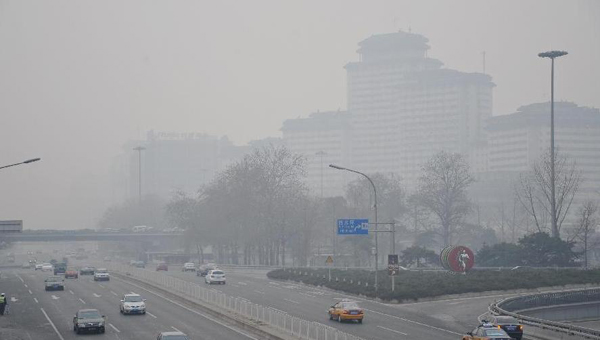Beijing targets capital's suburban smog
Updated: 2013-03-29 07:02
By Jin Haixing (China Daily)
|
||||||||
The Beijing municipal government has put the environment at the top of its work agenda this year, launching a campaign to tackle pollution, especially in the suburbs.
According to a plan released on Thursday, the government will make efforts to improve sewage disposal, garbage treatment and air quality, as well as curb illegal construction.
 |
|
The fog-shrouded buildings are seen in Beijing, capital of China, in this March 17, 2013 file photo. [Photo/Xinhua] |
Illegal buildings and land use are major problems in the suburbs, and the campaign will focus on structures built on collectively owned land in old towns and high-end communities, said Wang Wei, deputy director of the city's urban planning commission.
The government will spend a month curbing growth of illegal construction or land use and then make a list of illegal buildings.
From May to July next year, the city will gradually demolish those buildings, Wang said.
Wang Anshun, mayor of Beijing, said government departments and State-owned enterprises should take a leading role in demolishing illegal buildings owned by their branches.
To improve water quality from 2013 to 2015, the capital will set up 47 recycled-water plants and upgrade 20 sewage disposal plants, Beijing Water Authority said in a statement.
About 1,290 km of pipeline will be laid or upgraded for sewage disposal, the statement said.
According to the three-year plan released, Beijing will also build five garbage incineration plants by the end of 2015 to ensure more than 70 percent of the city's waste can be destroyed by burning.
The city already has two incineration plants. It can incinerate 16,900 metric tons a day, and the number will increase to 24,000 tons.
The sewage treatment, garbage incineration and forestry development will cost 100 billion yuan ($16.09 billion), said Mayor Wang Anshun.
He said the huge investment called for the reform of the market, which means that the government should lift restrictions and let the private sector participate in the investment.
Fang Li, deputy director of Beijing's environmental protection bureau, said the government will continue to take measures to cut emissions for air quality improvement this year.
The city will continue to control vehicle emissions using the policy that restricts private cars from being driven one day a week, based on the final digit of the car license plate, he said on Thursday.
Meanwhile, it may consider launching the policy in particular areas and periods to control the number of cars on road.
When the air quality is poor, the city will set up an emergency headquarters to resolve the problem, according to a government statement.
jinhaixing@chinadaily.com.cn

 Li Na on Time cover, makes influential 100 list
Li Na on Time cover, makes influential 100 list
 FBI releases photos of 2 Boston bombings suspects
FBI releases photos of 2 Boston bombings suspects
 World's wackiest hairstyles
World's wackiest hairstyles
 Sandstorms strike Northwest China
Sandstorms strike Northwest China
 Never-seen photos of Madonna on display
Never-seen photos of Madonna on display
 H7N9 outbreak linked to waterfowl migration
H7N9 outbreak linked to waterfowl migration
 Dozens feared dead in Texas plant blast
Dozens feared dead in Texas plant blast
 Venezuelan court rules out manual votes counting
Venezuelan court rules out manual votes counting
Most Viewed
Editor's Picks

|

|

|

|

|

|
Today's Top News
Boston bombing suspect reported cornered on boat
7.0-magnitude quake hits Sichuan
Cross-talk artist helps to spread the word
'Green' awareness levels drop in Beijing
Palace Museum spruces up
First couple on Time's list of most influential
H7N9 flu transmission studied
Trading channels 'need to broaden'
US Weekly

|

|








